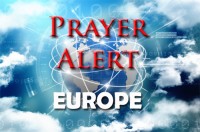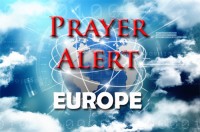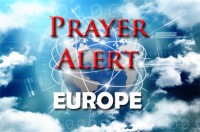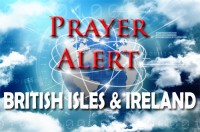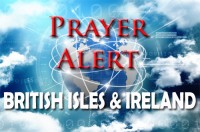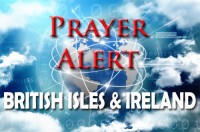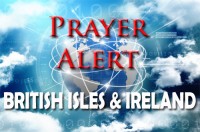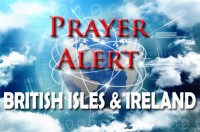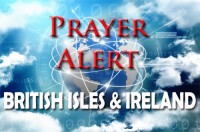German-Israeli youth exchange
‘As the generation that will become the leaders in our two countries in the future we, as young people, can tread paths to increase our understanding of one another, in a way that no adult politician can.’ This is a statement of a participant in a German-Israeli youth exchange programme. More than 9,000 young people and students from both countries each year take part in exchange programmes, which the Family Ministry supports financially. On behalf of many interested partner organisations in Israel, the German Youth Exchange Coordination Centre ‘ConAct’ looks for youth workers and organisations in Germany who want to set up exchange projects with Israel. This year partners will be introduced to each other in a two-part seminar. The first part is from10 to15 April in Israel, the second part in Germany from 29 May to 3 June.
Nordic Apostolic-Prophetic Watchmen gathering
From 29 April to 1 May there will be a Nordic Apostolic-Prophetic Watchmen gathering in Norway, where intercessors will be calling on the Lord to fulfil his prophecies for their land.Here are just four of the countries’ cries prior to the event. Sweden: Let’s pray that in every city the Lord will lift up someone He has chosen, often in prophetic calling, to blow the trumpet summoning believers to come together from different churches to pray for their city. Norway: We pray that the Lord will raise up those blowing the shofar in the cities and towns of Norway for intercessors to come together for their city, and that those whom God has called to start a prayer centre will seek the Lord and be bold in the work. Denmark: for mobilising God’s army in Denmark and preparing the Body of Christ to rise up to its destiny. Finland: for God to place the five-fold ministry gifts in the Body of Christ throughout Finland. See http://kingsministries.fi/europe/?lang=en
Iceland names new prime minister
Iceland's coalition government has appointed a new prime minister, a day after Sigmundur David Gunnlaugsson stepped aside in the wake of the Panama Papers scandal. It is unclear whether the move will satisfy angry Icelanders. Protesters, already fed up with the financial and political elite after the 2008 banking crisis wrecked their economy, have gathered on the last three nights in Reykjavik, some pelting parliament with yoghurt and eggs. Iceland has struggled to recover from the 2008 collapse of its highly indebted banks, the fall of a government, and the jailing of many bankers. Many Icelanders still harbour a strong distrust of their leaders. Pray for Iceland’s Christian radio Lindin as it reaches 90% of the population.
Germany: risks to security
A German intercessor says that the influx of refugees presents a challenge for the president of the Federal Office for Homeland Security, Hans-Georg Maassen. He sees three problem areas: 1) Active supporters and members of terrorist organisations entering Germany as refugees. 70% of migrants have no valid identification document. 2) Migrants become radicalised from accessing the Internet. 3) The attempts by Salafist Islamists to recruit migrants for terrorism activities. The situation has also led to a rise in right-wing extremism.
Prophetic word for the Church
In March, Rev Malcolm Duncan spoke at the World Prayer Centre (WPC) WATCHING 2016 prayer conference. It was a time of envisioning, watching and hearing what the Lord is saying in these times: there were also four workshops to equip people in prayer, evangelism and the prophetic. Malcolm brought a significant prophetic word to Christians in these islands. It builds on words spoken by Smith Wigglesworth (1947) and Jean Darnell (1967) of God’s call on Great Britain. The WPC believe it is right to release this Word to the wider Church. You can download the transcript of Malcolm’s prophetic word at: Please study and pray about this word, asking God for wisdom, direction and guidance, asking, ‘Lord, how are You calling me to respond to this? Show me Your heart for my neighbourhood, town, workplace or community.’ You can listen to the podcast talk on being a watchman by clicking the ‘more’ button.
Oxford theology students won't have to study Christianity
Students reading theology at Oxford University have overturned an 800-year-old tradition of studying Christianity throughout the course. Changes are being made to the undergraduate degree to ‘keep up with the changing face of Britain’. Students will have a broad choice of areas to study in their second and third year. One module is thought to be 'feminist approaches to religion and theology'. The move was instigated by students and lecturers challenging the lack of curriculum diversity, saying that the way religion is seen and practised in the UK had changed over recent years. Oxford University's theology faculty board chairman said, ‘The dominance of the Church of England has been receding, but religion hasn't disappeared. We want to offer students what is interesting for them.’
As One! - Scotland’s prayer shield
A national prayer call, promoted by Pray for Scotland (PfS) and Parliamentary Prayer Scotland (PPS), started on 27 March and will finish on 5 May, with a focus on Scotland’s elections. They are encouraging the Church in each city, town or rural community to come together in unity ‘As One!’ raising a shield of prayer over their area. This already happens in a few areas, but they believe God is calling the Church throughout the nation to do this on a regular, ongoing basis as part of His plans for changing Scotland’s spiritual atmosphere. Ask God to raise up leaders with integrity and wisdom who will act justly, care for the vulnerable, advocate for the weak, and work for the common good.
UK tolerating secret tax havens
The ‘Panama Papers’, documents leaked to the investigative journalists, show that the British Virgin Islands is the most popular location for banks and law firms to facilitate corrupt and criminal business. The UK is second only to Hong Kong as the largest host of illicit trade. One aspect of financial secrecy that is overlooked is the impact on people in the poorest countries. A Christian Aid and Financial Transparency Coalition review of the leaks from the Swiss branch of HSBC showed that poorer countries lose far more to tax evasion than rich ones. Christian Aid said, ‘The Panama Papers have exploded any remaining excuses the UK had for allowing secrecy in its tax havens. This leak exposes the extent to which UK tax havens and UK-based intermediaries are at the very heart of this rotten system.’ See also article 1 in this week’s World section.
A call for better-quality early learning
Last October Channel 4 aired a documentary on ‘The Secret Life of Four Year Olds’; four is the age most crucial in a child’s development as they cross the threshold from family life into school. The tools of social interaction the children learn at this stage lay the foundations for relationships they will form across their adult lives. Dr Elizabeth Kilbey took part in the programme and recognises the need for the government to invest in better quality early learning. She is petitioning the government to ensure that there is an early years teacher in every nursery in England by 2020. Save the Children’s research has found that 1 in 5 children start primary school behind in basic language skills (1 in 3 of the poorest children). If a child starts school behind, they struggle to keep up and don’t achieve their potential. See also:
Father can’t take his son to church because mother is a Muslim
A British father was banned from taking his son to church after the boy's Muslim mother won a court order at Derby Crown Court preventing the boy from attending. The father, a non-practising Muslim, has close connections to his local Christian community. He is divorced from the boy's mother and was warned he could be denied access to the nine-year-old if he takes him to church or a Christian leisure centre. The father, born in England to Pakistani parents, has lodged an appeal with the High Court to have this order overturned. 'This judge is simply scared of being branded Islamophobic,' he said. 'I want my son to have a balanced life in which he is exposed to different faiths and can make up his own mind about religion.’ The boy sees his father every other weekend. The order also decrees that he must provide only Halal food.


